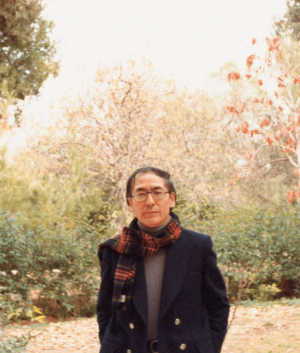Masatoshi Gündüz Ikeda facts for kids
Quick facts for kids
Masatoşi Gündüz İkeda
|
|
|---|---|
 |
|
| Born |
Ikeda Masatoshi (池田 正敏)
25 February 1926 Tokyo City, Japan
|
| Died | 9 February 2003 (aged 76) Ankara, Turkey
|
| Nationality | Turkish |
| Alma mater | Osaka University |
| Awards | Mustafa Parlar Foundation Science Prize (1993) |
| Scientific career | |
| Fields | Algebra |
| Institutions | Ege University Middle East Technical University |
| Thesis | On Absolutely Segregated Algebras (1953) |
| Doctoral advisor | Kenjiro Shoda |
Masatoşi Gündüz İkeda (born February 25, 1926, died February 9, 2003) was a famous mathematician. He was born in Japan but later became a Turkish citizen. He is well-known for his important work in a special area of mathematics called algebraic number theory.
Contents
Early Life and Love for Math
Masatoshi Gündüz İkeda was born in Tokyo, Japan, on February 25, 1926. His father, Junzo Ikeda, worked as the head of a statistics department at an insurance company. His mother was Yaeko Ikeda.
Masatoshi was the youngest of four children. He had one brother and two sisters. From a young age, he loved reading math books that belonged to his father. He even bought used math books and stories about famous mathematicians. He was especially inspired by the French mathematician Évariste Galois.
His Journey in Academia
Ikeda finished his studies in mathematics at Osaka University in 1948. He earned his PhD degree in 1953. His special research paper was titled "On Absolutely Segregated Algebras." His professor, Kenjiro Shoda, guided him during this time.
In 1955, he became an associate professor. From 1957 to 1959, he did more research in Germany at the University of Hamburg. There, he worked with another famous mathematician, Helmut Hasse.
Moving to Turkey
In 1960, Professor Hasse suggested that Ikeda go to Turkey. So, Ikeda moved to İzmir and started working at Ege University in 1961. He was hired as a special foreign expert in the science department.
In 1964, Ikeda married Emel Ardor, a Turkish biochemist. He had met her and followed her to Turkey. He decided to become a Turkish citizen and also converted to Islam. He chose the Turkish name Gündüz.
He became an associate professor in 1965 and a full professor in 1966. In 1968, he moved to Middle East Technical University (METU) in Ankara as a visiting professor. After his term, he was offered a permanent job there. He accepted this offer, partly because of the mathematician Cahit Arf, whom he had known for a while.
Teaching and Research
Throughout his career, Ikeda was invited to teach at many universities. He was a visiting professor at:
- The University of Hamburg (1966)
- San Diego State University in California (1971)
- Yarmouk University in Irbid, Jordan (1984, 1985–86)
In 1976, he also did research at Princeton University. Later that year, he went to Hacettepe University in Ankara. He led the mathematics department there until 1978 before returning to METU. He retired from METU in 1992. His main area of study was Galois theory, which is a very important part of algebra.
Ikeda also worked at several research places in Turkey. These included the TÜBİTAK Marmara Research Center and the Turkish National Research Institute of Electronics and Cryptology. Towards the end of his career, he worked at the Feza Gürsey Basic Sciences Research Center in Istanbul. He was also a member of the Basic Sciences Board at the Scientific and Technological Research Council of Turkey (TÜBİTAK). He led the Mathematic Research Unit at METU.
Family and Legacy
Masatoshi Gündüz İkeda passed away on February 9, 2003, in Ankara. A religious funeral was held on February 12 at Kocatepe Mosque. He was buried at the Karşıyaka Cemetery. He had two sons, both born in Turkey.
Awards and Honors
In 1979, Ikeda received the TÜBİTAK Science Award for his amazing work.
To honor his memory, the Mathematics Foundation of Turkey created the "Masatoshi Gündüz İkeda Research Award." This award helps support new research in mathematics.
See also
- Anabelian geometry
 | Dorothy Vaughan |
 | Charles Henry Turner |
 | Hildrus Poindexter |
 | Henry Cecil McBay |

